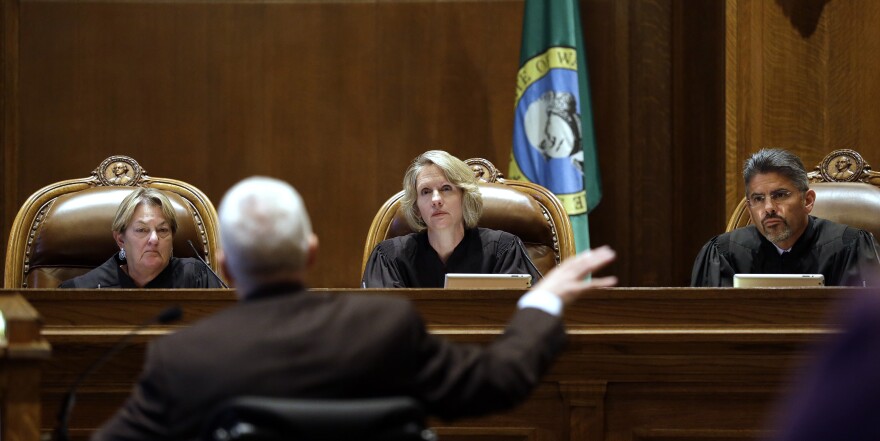We learn in school that the three branches of government -- the legislative, the executive, and the judicial -- are designed to provide checks and balances on each other.
To understand what that looks like, a good place to start is the Washington State Legislature, which is being held in contempt by the state Supreme Court for failing to fund basic education.
McCleary v. State
The state Supreme Court and the legislature first clashed over education in 1978 during Seattle School District No. 1 v. State. That ruling determined that it's the Legislature's job to define and fund basic education under Article IX, Section 1 of the state constitution:
It is the paramount duty of the state to make ample provision for the education of all children residing within its borders, without distinction or preference on account of race, color, caste, or sex.
Fast forward to 2007, when Stephanie and Matthew McCleary along with a host of school districts, teachers, and unions first sued the State of Washington for failing to fund basic education. The case eventually made its way to the state Supreme Court.
Early on during oral arguments for the McCleary case in 2011, Justice Charles Wiggins asked, "How do you really determine whether the legislature is amply providing for the education of all children of the state without looking at dollars?"
That question is the main problem legislators face today. The McCleary case involves several complicated issues from transportation costs and teacher salaries to class sizes to the state's local levy system.
But as the late Justice Tom Chambers noted later during oral arguments, this case isn't just about education.
"We have said that the Legislature is in a better position to have studies and evaluate options and make political decisions. That's not our job," Chambers said. "So what would you have us do specifically in terms of a remedy?"
The McCleary case also illustrates the tension between two branches of government: the judicial and the legislative.
The Dance of Two Branches
In 2012, the state Supreme Court found that the state was not meeting its constitutional obligation to fund education.
Once that decision came down, the Legislature and the judiciary entered into a kind of dance, according to Seattle University constitutional law professor Andrew Siegel.
"This kind of issue, where there is an enforceable individual right that requires budgeting, planning and policy decisions inherently creates separation of powers problems," Siegel said.
That enforceable right is the right to a basic education. And as Chambers said, the court had to come up with a remedy.
That remedy was a 2018 deadline for the Legislature to fund education, along with several interim deadlines with regular progress reports.
As the court oversees the Legislature on this issue, it leaves one branch trying to keep up and the other trying not to step on toes. The dance got a lot more elaborate two years later, when the court found that lawmakers weren't making good enough progress and held the state in contempt.
When someone is found in contempt of court, that person typically faces sanctions. Those sanctions are meant to coerce someone to do what the court has asked. For an individual, that could mean anything from a fine to jail time.
The state Supreme Court eventually did impose sanctions in 2015, ordering the state to pay $100,000 each day that it fails to come up with a funding plan.
When the court tells an individual to pay a fine, that money goes back to the government. But asking the government itself to pay makes the process more complicated.
Payment of the Fines
Before understanding how the fines are supposed to be paid, it's important to understand that the legislative branch controls the state's budget. Only the Legislature can create accounts and appropriate funds.
The court's sanction order was very specific:
The penalty shall be payable daily to be held in a segregated account for the benefit of basic education ... The court assumes and expects that the other branches of government will comply in good faith with orders of the court issued pursuant to the court's constitutional duties.
The Legislature has not yet created this "segregated account," nor has it appropriated funds to pay the fines.
In order to stay in compliance with the court's order, the state Office of Financial Management is keeping track of the fines. As of Monday, the state owes $52.9 million.
Roselyn Marcus is the assistant director for legal and legislative affairs at OFM, which basically does the books for the state. She said it's important to remember that those millions are coming out of the billions it will take to fully fund basic education.
"Making the accounting may not feel like compliance with the court," Marcus said. "But it is ensuring that the state is tracking the amount of money the court has said that we owe."
Siegel, the constitutional law professor, noted that the Legislature's failure to create the account could open up the state to more sanctions. But throughout the McCleary case, the court has been trying to let the Legislature do what it's designed to do.
"The court kind of took a medium course," Siegel said. "They could have imposed really draconian sanctions, where some courts in other states might have imposed them."
One example is 1976 New Jersey, when the state Supreme Court shut down public schools for eight days because the Legislature failed to raise taxes for education. Other sanctions could include shutting down other social services or auctioning off state-owned property.
Next Steps
If the Legislature fails to come up with a plan by the end of the 2017 session, the court will likely impose harsher sanctions, Siegel said. The real question is what happens if lawmakers do come up with a plan, but the court finds it insufficient.
"If the court determines that they kind of made a good-faith effort, but failed, then we could be back at this again for awhile," Siegel said. "If the court determines this is nowhere close, it's not a good-faith effort, then maybe we're in the realm of some significantly harsher sanctions."
Ever since 1978, when the court decided that Washington children have a constitutional right to a basic education, providing that education hasn't just been about finding the money to do it. It's also been about the fundamental roles of the different government powers.
"Because a solution involves the core functions of both branches," Siegel said. "It involves the judiciary's obligation to ensure remedies for violation of rights and it involves the Legislature's prerogative to make those kinds of political, policy, budgetary decisions."
This piece is the first segment in our series, "Unpacking Government," which airs every Monday.







